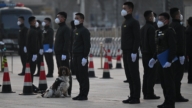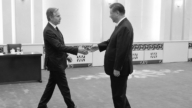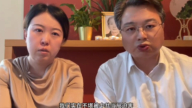【新唐人2012年12月26日讯】中共十八大后,习李新政展开。中共各级领导在各种场合的讲话,突然被要求少用“讲话稿”。但中共政权历来形成的官场文化是﹕照着稿子一字不差的读。因此,如何不照本宣科、脱稿说出口语化的工作报告,考验着中共各级领导,攸关官员的仕途。中共领导人脱稿演出,会不会出乱子?看看专家怎么说。
对于中共政府一把手来说,最重要的“讲话稿”就是政府的工作报告。据大陆媒体《南方周末》报导,在严肃的场合,比如做政府工作报告时,领导会照着稿子一字不差的读,半点发挥都没有。
而对于相当一部分领导来说,“讲话稿”在可有可无之间:不念讲话稿,是对“秘书班子”的不尊重,而照念讲话稿,又是对台下群众的不尊重。
报导指出,现实生活中,满嘴官话、套话的领导也有,但不管开什么会,他们却都“不加思考”的念稿子,既不用担责任,也不会出问题。
原《河北人民广播电台》编辑朱欣欣:“有个人的一些发挥的话,可能就存在着犯错误的危险,或者是,认为你不统一口令。就形成这种领导讲话都照稿子念。这种体制也造成这种作风很僵硬、僵化和教条,做事情缺乏灵活性,不能应对各种复杂的社会的形势、各种各样的矛盾。”
中共领导人照“讲话稿”念稿演出的这一作风,正成为中共中央改进的目标。今年12月4号,中共中央政治局召开会议,会议一致同意关于改进工作作风、密切联系群众的八项规定,其中专门提到“要精简会议活动,切实改进会风”、“提高会议实效,开短会、讲短话,力戒空话、套话。”
时政评论员华颇认为,中共官员说话背后,都有笔杆子等幕僚来抓刀,但习、李想与其他领导人有所区别。华颇说,关键是他们怎么做﹗是不是把事情做到实处,不再口惠而实不至﹗
时政评论员华颇:“以前领导人都是照本宣科(念稿),习李这回上来,力图给人一种清新的作风,来换取民众对他们的信任。他们的稿子,我想当然旁边要有些秘书、笔杆子为他们准备,但是用与不用,用多少,他们要有取舍的。”
报导指出,事实上,新一届中央政治局常委已率先行动。11月15号,习近平在媒体见面会上做了一番简练、亲民、务实的发言。此后,李克强在全国综合配套改革试点工作座谈会上,打断官员发言,要求不要念稿,并且频繁的即兴提问。王岐山则在反腐座谈会上,要求少说客套话,少用讲话稿。
中国历史教授李元华:“讲话的出发点最重要。可是他们现在整个都是在抓形式上的东西,比如说,你一定要脱稿、你要表达自己。其实王岐山和李克强他们也不能真正表达自己想说的东西,他们也会瞻前顾后的,他们也会考虑中共权贵各派利益之间的东西,他们说的话也是很多都是身不由衷的话。”
报导说,随着网路的传播效力日益增强,许多官员意识到,“要用讲话争取老百姓的支持”。
华颇:“你如何使数万上访大军能够弃访、罢访,把那些征地拆迁老百姓掠夺的财产还给人家,使那些有病的老百姓老有所养,孩子能够有公平受教育的机会,官员的财产是不是能够彻底的公开,这些是他们所要做的。”
习近平最近还吸纳网路热词“积累正能量”,来作为讲话元素。
但中国历史教授李元华强调,他在讲这些话的出发点是什么﹖是真正为百姓办事情,还是说,只是为自己,保住这个官去说话,这是最关键﹗
采访/李韵 编辑/周平 后制/钟元
CCP’ Unscripted Speeches: Honesty or Chaos?
After the Chinese Communist Party’s (CCP) 18th congress,
Xi Jinping and Li Keqiang began with new leadership rules.
Leaders are requested to give speeches
by using as less scripts as possible.
The CCP’ officials’ culture is to read
every word written in the script.
Thus, it is a test for each official to give unscripted speeches,
it is important and it influences their career.
Will giving unscripted speeches lead to honesty,
or chaos amongst officials? Let’s take a look.
For a CCP’ governmental leader, the most important speech
is the one of presenting his work report.
The Southern Weekly newspaper in mainland China reported
that in a serious occasion, such as work report, leaders will read a script without an error, there is no room to play.
For some leaders, the script is indispensable:
it is a sign of respect to secretarial team and the audience.
The report said that in real life leaders talk with formality.
Regardless of the meeting, they will read without thinking.
They neither take responsibility for,
nor are worried about things going wrong.
Zhu Xinxin, former editor in Hebei People’s Radio Station:
“To let an individual talk, there is a risk of making mistakes.
Or you’d be seen as not “being on the same page” with others.
Therefore this habit of reading scripts had taken place.
This system is the leading cause
of forming such a stubborn and formal nature:
to do things with lack of flexibility, and to not be able
to deal with complicated situations and conflicts.”
Now, to change the habit of reading scripts
is becoming CCP’s next goal.
On December 4, 2012, the Central Politburo held a meeting,
and everyone agreed on eight rules to improve their work, and keep close ties with civilians.
It specially mentioned, “to streamline the meeting,
and practically, to improve the meeting quality.”
“To improve meeting’s efficacy by having short meetings,
and to talk concisely, avoiding empty and formality talks.”
Hua Po, Current Affairs’ commentator believes,
officials usually use assistance to prepare their scripts.
However, Xi Jinping and Li Keqiang
intend to be different.
Hua Po said that the key point is how to do it,
how to do it practically, without the empty talk!
Hua Po: “In the past, leaders read script in the meeting,
Xi and Li intend changing this to win the public.
Their scripts are certainly prepared by their secretaries,
but to use them or not, or how much to use, is up to them.”
The report pointed out that actually,
the new Politburo has taken the lead in this.
On November15, Xi gave a speech in a press conference,
and he talked to the point, approachable and practical.
Later, Li Keqiang interrupted official’s speech in a national
work meeting, asking them not to read the script. In addition, he raised prompt questions.
In an anti-corruption meeting, Wang Qishang requested
officials to use less formalities and the scripts.
Li Yuanhua, History Professor, China: “The aim of a speech
is the key. However, all of them now focus on the surface.
Such as you must abandon the script,
and express yourself.
Actually, Wang Qishang and Li Keqiang can’t say
what they want, they have to consider many things.
They have to consider the CCP’s different factions interests.
Most of their speeches were also not from their heart.”
The report says, with the increasing spread of Internet,
officials realize they can “use their speech to fight for people’s support."
Hua Po: “How to handle tens of thousands of petitioners?
To persuade them to abandon their petition visits,
and to return or resettle their looted properties?
How to take care of the sick,
and to create a fair education opportunities for children?
Or how to disclose fully officials’ ownerships?
These are all facts that people want to know about."
Recently, Xi Jinping used the Internet terms
“accumulate positive energy” as elements of his speech.
Prof. Li Yuanhua emphasized,
what is the purpose of Xi’s speech?
Does he really serve the people, or himself. Talking for
the sake of ensuring his position, is the major point!





























